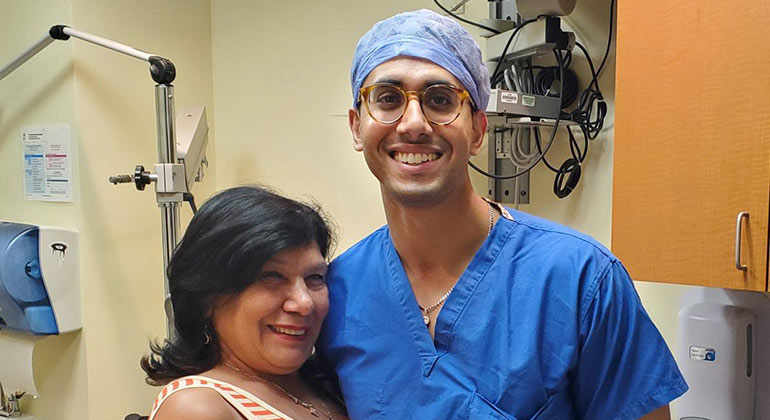
After Two Retinal Detachments, Woman Sees Better Than Ever
Nancy Palazzo, a Brooklyn resident in her early 60s, first noticed a problem with her eyes when she started seeing black dots. “They looked like flies,” she says. Nancy ignored the dots for a while, and then tried eye drops. “I got the most expensive eye drops I could find,” she explains. After a week or so, her vision started to get cloudy. “It was like a black shade coming down over my vision.” She complained to her daughter, who told her to go to the emergency room. “If it wasn’t for my daughter,” Nancy says, “I’d probably still be trying eye drops.”
Nancy’s health journey led to a diagnosis of a retinal detachment, and two procedures by Avnish Deobhakta, MD, a vitreoretinal surgeon at New York Eye and Ear Infirmary of Mount Sinai. Retinal detachments are not uncommon in people between ages 40 and 60, Dr. Deobhakta says, and anyone with symptoms should see an eye doctor.
“I tell patients that if they have floaters or flashes of light in one eye, and they don’t go away in three or four hours, they should go see their eye doctor as soon as possible,” he says. “If we don’t treat it right away, it can result in vision loss or blindness.”
Nancy is grateful for her daughter’s advice. When she went to the emergency department at the New York Eye and Ear Infirmary of Mount Sinai, doctors checked her vision and eye pressure and did both a fundus photograph and an optical coherence tomography scan to view the back of her eye. She was diagnosed with a detached retina on the bottom (inferior part) of her right eye and ended up in the care of Dr. Deobhakta, a retina specialist and Associate Professor of Ophthalmology at the Icahn School of Medicine at Mount Sinai.
“I thought I’d get eye drops or glasses or something simple,” Nancy says. “But they told me I could lose my vision if I didn’t have surgery immediately. That was scary.” Dr. Deobhakta and Dr. Yafeng Li, MD, a vitreoretinal surgical fellow at New York Eye and Ear, performed a vitrectomy to reattach the retina to the back of the eye.
“As we age, the jelly-like substance in the eye, called vitreous fluid, pulls on the retina. But sometimes the jelly pulls the retina away from the back of the eye,” and that needs to be fixed, Dr. Deobhakta says. “We basically remove the jelly. Then we take a small tube-like straw, called a soft-tip backflush cannula, and suck out the fluid from behind the retina. This allows the retina to flatten itself against the back of the eye.”
Nancy’s vision was immediately improved, and she was sent home and told to keep her head tilted down for a week. “You can still open your other eye and use your phone, but you have to be facing down while you're doing it,” says Nilesh Raval, MD, the current vitreoretinal surgical fellow at New York Eye and Ear.
“Inferior retinal detachments are the type that are most at risk of re-detachment,” says Dr. Deobhakta. And that is what happened. Two weeks later, Nancy’s vision dimmed again; her retina had re-detached. “We examined her with a slit lamp and an indirect ophthalmoscope, which lets us look at the retina very closely,” explains Dr. Deobhakta. “We found that she had a number of tears at the bottom of her retina.”
Nancy needed another surgery. “This time, Dr. Deobhakta and I put a scleral buckle around her eye and performed an additional vitrectomy with silicone oil exchange,” Dr. Raval says. Schleral buckling helps hold the retina against the back wall of the eye and is often used to treat a second detachment. “Silicone oil is generally safe for the eye,” he adds.” This time, Nancy’s sister, Maria, stepped in to help after the procedure. “She had me stay with her, and she was very strict with me,” Nancy says. “She would yell at me if I picked my head up for even a second. She was very helpful.”
The procedure worked, and now Nancy’s vision is even better than it was before the floaters invaded. “New York Eye and Ear saved my sight twice,” Nancy says. Her doctors were similarly pleased. “While the retina can re-detach, we are pleased with her outcome, as we did not expect her vision to be this good,” Dr. Raval says. “With glasses, Nancy’s vision could be 20/20.”
Nancy is thrilled with the results. “I didn’t realize how important your vision is until I almost lost it.” She is equally pleased about the care she received at New York Eye and Ear Infirmary of Mount Sinai. “I can’t explain enough how great they were. Every single person in that hospital, even the receptionist. Usually I hate going to the doctor, but I looked forward to going. That’s how great they were.”